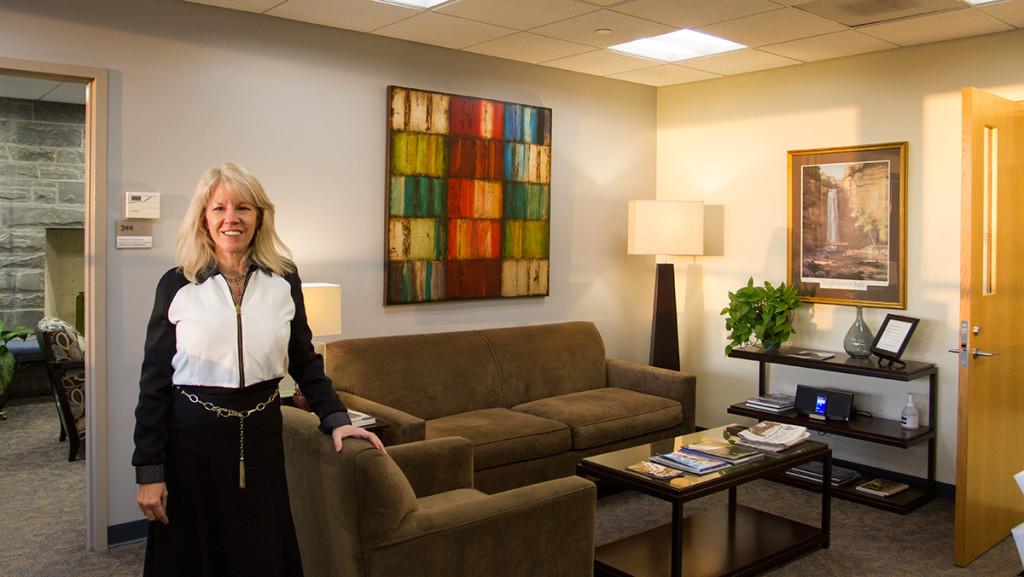The Office of Civic Engagement was given a physical space this year on the third floor of the Campus Center that students can use to meet with outside community partners.
The new space includes offices, meeting rooms, consulting rooms and a waiting area.
Patricia Spencer, faculty director of service-learning, said the OCE was given a physical space this year because there was a need for a more accessible, centralized hub that outside partners could use specifically for collaborating with students.
The collaborative room is available to all students and student organizations that are collaborating with outside community partners. Junior Kaitlin Logsdon, an OCE administrative intern, said a focus this semester has been letting students and student organizations know about the new space.
“In the spring semester, we will be talking to the student organizations that have community partners about the new space,” Spencer said. As of right now, the new space has been used by the Student Government Association and a small number of student organizations. Those interested in using the new space can sign up by contacting the OCE.
The OCE was established in 2012 as part of President Tom Rochon’s IC 20/20 initiative
so students could engage in a type of community-based learning called “high impact practices,” Spencer said. This includes undergraduate research, cultural immersion, professional practice including internships, service–learning and other activities that produce more intensive and immersive learning experiences. The office also conducts Cultural Competency Programs for several programs and departments on campus.
The Cultural Competency Program involves looking at identities and challenging stereotypes in a way that is designed to trigger thinking, Spencer said. A significant component of the program involves addressing race-related issues and assumptions.
The OCE has been working this fall to better prepare students in formal programs like the Honors Program, the Martin Luther King Scholar Program and the Park Scholar Program that are engaging with community partners. Spencer said the Cultural Competency Program has become popular with many groups and schools within the college.
Another focus of the OCE is to deepen relationships with community partners that students participate in through service-learning courses, student organizations, internships and other activities. The OCE is working on bridging student interest, energy and skill in a way that answers community needs such as food access, poverty and sustainability.
One example of a student-community relationship is through Human Expression Through Arts: A Resident Development Program, which involves a group of students working with incarcerated youth between the ages of 14 and 21 each Saturday at the MacCormick Secure Center 15 miles east of Ithaca to deliver creative arts programming such as music and dance lessons, poetry and performance art.
“I have watched residents find their voice through this program, and most of all I’ve seen IC students challenge stereotypes and discover and question their privilege,” Spencer said.
Sophomore Elena Haskins is involved with the HEARD program and said the opportunity to interact with residents at the MacCormick center makes her more aware of other people.
“Whenever we leave the facility and the door locks behind us, we always say, ‘We’re leaving and they’re not,’ and seeing people who have to deal with that on a day-to-day basis is eye–opening,” Haskins said.
A new relationship the OCE established this year is with the Cayuga Medical Center, through a program called the Patient Care Advocacy Training Program, which is in collaboration with Cornell University and is open to all students. The program requires students to serve as advocates for assigned patients as well as attend training and monthly seminar meetings.
The OCE also offers students the opportunity to participate in community–based learning through Service Learning Courses, courses that involve students participating in outside community service as part of their coursework. All students can take SL courses, though Spencer said many don’t know about this opportunity. The office is currently in the process of designating these courses so that students can easily look them up or find them with an SL attribution.
Spencer said the most important aspect of civic engagement is for students to participate or volunteer with an issue they are passionate about and develop a deeper level of engagement with a community partner that focuses on that issue. She said students can achieve this deeper level of community engagement through a service learning course, a student organization, community employment and community service.
“If there’s one word to describe us, it’s ‘intentional,’” Spencer said. “Students have to discover their real passion and then take that passion and develop a deeper level of engagement and make an impact in their community. We serve as a bridge so that students can do this.”








